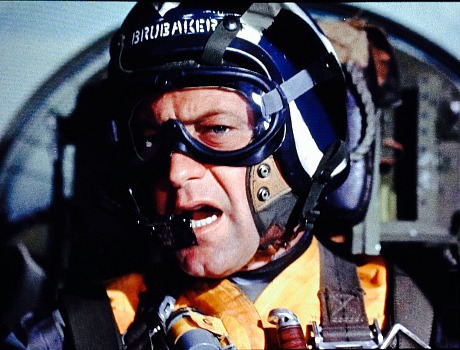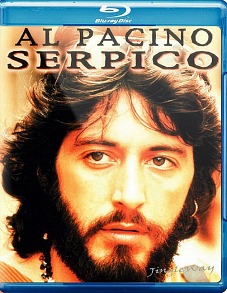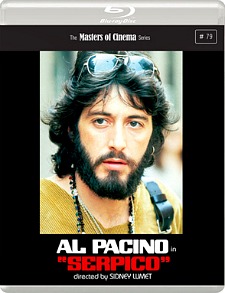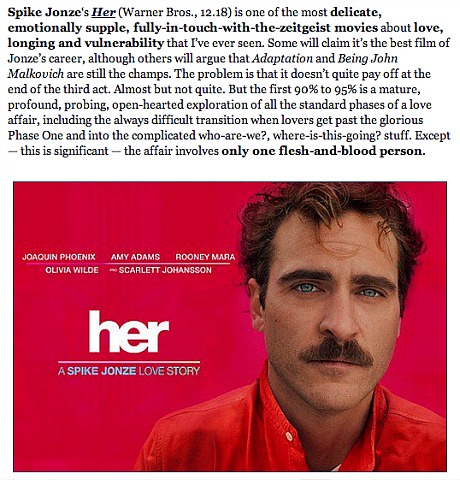Sometimes it’s nice to just take it easy and downshift and be gentle. The tender intimate stuff. Hugs and pecks and nice slow hands. Hair-strokings, back-scratchings. And some quiet, murmuring conversation. Later with the cat ‘o’ nine tails broomstick action. That said, I’d prefer to see the five-and-a-half hour version of Lars Von Trier‘s film when and if I attend the Berlin Film Festival. I read somewhere that this version might not screen until Cannes.
Daily
Boxy “Bridges” Still Eluding Fascist Cleaver
I’ve watched Mark Robson‘s The Bridges at Toko-Ri (’54) four or five times since the mid ’90s. I’m a fan for several reasons but one of the biggest is Loyal Griggs‘ richly Technicolored, perfectly lighted cinematography. But I’d never seen it in high-def until renting it last night on Vudu, and lo and behold this December 1954 release hasn’t been whacked down to 1.66 or 1.85, as per custom when ’50s films get remastered for high-def or Bluray presentation. Boxy is beautiful on its own terms, of course, but 1.37 renderings of high-def, sharply focused 1950s Technicolor…heaven.

William Holden as Lt. Harry Brubaker in Mark Robson’s The Bridges at Toko-Ri, a Paramount release that opened in December 1954.
Toko-Ri‘s lustrous, high-end appearance suggests it was shot in VistaVision, but it was captured in straight 35mm. It was clearly framed to protect a 1.37 aspect ratio with allowances for possible theatrical matting to 1.66, the aspect ratio that its distributor, Paramount Pictures, had been endorsing at the time. The studio was actually in the throes of changing over from 1.66 to 1.85 aspect ratios in December ’54. (Its first 1.66:1 VistaVision release, White Christmas, opened in January ’54.) Should this film ever appear on Bluray (which doesn’t seem especially likely), this history could be used by the 1.85 fascists to justify cleavering The Bridges at Toko-Ri down to 1.85 or at least 1.66.
Spirit of Attenborough
Justin Chadwick‘s Mandela: Long Walk to Freedom opens on Friday, 11.28. In my 9.9.13 Toronto Film Festival review, I called it a “classic” biopic in the sense that it feels like it was made 30 or 40 years ago. It’s basically the life of Nelson Mandela by way of the sensibility of Richard Attenborough‘s Gandhi (’82). That makes it a reverential but generally mediocre film about a great man and a great saga.
“It is saved or at the very least enobled by Idris Elba‘s stirring, highly charismatic performance as Mandela — the first breakthrough performance that the 41 year-old Elba has given on the big screen or anywhere else for that matter.” Note: Despite what some commenters are claiming, Elba’s striking, first-rate work in The Wire and BBC One’s Luther were not what any fair-minded person would call “breakthrough”-level. The applicable terms are “noteworthy” and “distinctive.” Winning over hip connoisseurs of cutting-edge cable fare does not a breakthrough make.
“This is a respectably safe, square and stodgy movie in which the political marches and demonstrations almost feel like they’ve been choreographed by a Broadway musical pro,” I wrote. “When an occasional political song is sung the demonstrators sing in harmony. Like Variety‘s Scott Foundas said, screenwriter William Nicholson has written a ‘CliffsNotes version of Mandela’s nearly 700-page memoir’ that ‘is slathered in golden sunsets, inspirational platitudes and John Barry-esque strings.’ The music drove me half-crazy, I must say.
Plague of the Snyder
All corporate CG-driven superhero zombie movies are torture to varying degrees, but Zack Snyder‘s Man of Steel‘s was a stand- out. It delivered an 80-minute action finale (Henry Cavill‘s Superman vs. Michael Shannon‘s General Zod) that may have been…no, was the most oppressively boring, prolonged and soul-numbing experience of my moviegoing life…ever. I realize that Snyder was probably trying to top a similar action finale in 2012’s The Avengers, but something really foul and acidic came alive in my system as I sat through Snyder’s version. I decided then and there that Snyder, whom I’d started to intensely dislike after seeing Sucker Punch, is some kind of despicable aesthetic force. I hated Nicholas Winding Refn‘s Only God Forgives more as a start-to-finish creation. I was half-okay with the first hour of Man of Steel (liked the solemn tone, thought Cavill was pretty good) but that finale…man, that finale was something evil. So let’s consider the possibility that Snyder is an actual cinematic demon. I’m not exaggerating. I think he’s as much of a spreader of a kind of disease as Michael Bay was thought to be in his own right. And I fear that Batman vs. Superman…I don’t want to think about it.
Screaming Thighs
I had Thanksgiving dinner today at a food court, eating very little and spending most of my time glaring and scowling at happy families who were laughing too loudly. Kidding — just messing with Glenn Kenny. Seriously, I just came back from a Runyon Canyon hike. A nice dinner followed. I couldn’t watch the Pittsburgh-vs.-Baltimore game so I’m about to watch a screener of Spike Jonze‘s Her. And then a Bluray of The Man Who Shot Liberty Valance.


Guys On The Take
I’m very comfortable with Sidney Lumet‘s Serpico in the same way I’m partial to all of his slightly ratty, splotchy, New York-based melodramas. Particularly the ones shot during the ’60s, ’70s and early ’80s (i.e., Prince of the City) when Manhattan was a lot grimier and skankier and more challenging to the sensibilities of complacent out-of-towners than it is today. They’re immersions into the culture and character of a city that I miss in a way — a city that was much less corporate and yuppified and Starbucky. The irony (and I’m not entirely sure what to make of this) is that while I admire people of sharply defined moral character and purist rectitude, I’ve always felt more at ease with people who have allowed a modest portion of corruption into their life. You have to play ball in this world, at least to a certain extent. Which is another way of saying that I enjoy the milieu of Serpico more than the man portrayed by Al Pacino. Either way I wish I had the new Bluray (which streets on 12.3) in hand right now. A perfect Thanksgiving Day movie.


Cockatoo Thanksgiving
I’m very thankful for my life and career having turned out fairly well so far, and so there is a measure of peace as I leave Mexico this morning, the secret mission having been accomplished. The success of Hollywood Elsewhere and all that has flowed from that hasn’t been served on a plate. I earned it, brick by brick and phrase by phrase. The talent and discipline that I summoned to make this happen weren’t gifts either, but I’m enough of a meditative mystic to understand that luck is a big part of things, and so I’m grateful, very grateful, for the luck that has come my way. And for my two sons and my friends and occasional romantic flames, and the feeling of being loved. (Or at least liked or supported in some spiritual way.) I’m immensely grateful that I wasn’t born to a middle-class, downmarket family in Nebraska or Montana or to some resigned, lethargic, drinking-class environment. I’m thankful that sobriety is now the basis of my life, and that I don’t eat turkey or mashed potatoes or yams or sweet potatoes or any orange-colored vegetable served steaming at the table. I love Thanksgiving downshifting because it means a major Bluray and Vudu HDX submission for a day or two.
Warren, Sanders…And Then Clinton
The key to a healthy economy and culture is a strong, stable, adequately compensated middle-class, but that ideal has been steadily undermined for over three decades, or since the financial deregulation policies of the Reagan era began to take hold. This is the central, unassailable message of Jacob Kornbluth and Robert Reich‘s Inequality For All — a wise and perceptive documentary that doesn’t push an agenda as much as lay it down on the kitchen table, plain and straight. The cancer of our culture is extreme income disparity. The 1% oligarchs own 38 percent of the financial wealth of America, while the bottom 60 percent owns 2.3 percent of the wealth in America. If this isn’t a recipe for anger and despair, I don’t know what would be. Moral and social rot will continue to manifest in the form of pathetic and tedious wealth envy — i.e., “if only I could live like Kim Kardashian.”

Her Due For A Surge
A day or two ago a New York media guy wrote to say he saw David O. Russell‘s American Hustle “yesterday” (two days ago, I’m presuming) and that “it’s DOR trying to be Scorsese.” (Not a novel observation.) The reason I’m posting this is the kicker: “Every critic I talk to says their favorite of the year is Spike Jonze‘s Her.” Is this an indication of where the N.Y. Film Critics might go? Variety‘s Tim Gray indicated a few weeks ago that Her will be seen as a challenge to the rank-and-file. (Don’t you just love it when it when complacent industry farts pooh-pooh films as good as this?) Here’s my 10.13.13 review.

Wolf In Ten Days
I don’t know if extra-special, super-secret screenings of Martin Scorsese‘s The Wolf of Wall Street will happen for the New York Film Critics Circle and the National Board of Review before they vote next week, but I do know that Broadcast Film Critics Association members (myself included) have been invited to a Wolf screening on Friday, 12.6, around midday. There’s a simultaneous New York City screening happening at the same time. I was sort of hoping for a screening earlier in the week. If I was running the NBR and NYFCC I would order a delay in the voting so Wolf could be included. Maybe this won’t be necessary, as noted, but who knows? Not me.

Guess What?
If The Social Network had been made three years later and released two weeks ago, it would be the hands-down favorite to win the Best Picture Oscar right now. It would be the quality alternative that the 12 Years A Slave crowd could transfer their allegiance to if they felt the tectonic plates shifting, and which the Gravity softies could respect and probably vote for at the end of the day. I watched this clip again because (a) I love it, (b) I wanted to re-assess Dakota Johnson in lieu of her forthcoming 50 Shades of Grey role, and (c) I was wondering if Justin Timberlake will ever seem quite so charismatic or play another scene as good. Luck might not be with him — you can never be sure. This might be his all-time Hollywood peak right here.
Brilliant Dern Narrative
“I’m not saying this is a great performance, but I would say that it’s a complete performance. From beginning to end, I think the character is there.”
The quote is from Bruce Dern in an 11.27 interview with TheWrap‘s Steve Pond. Speaking, of course, about his inhabiting of the sullen, irascible, partly-out-to-lunch Woody in Alexander Payne‘s Nebraska. This is, no shit, one of the most eloquent and affecting things any actor has ever said about his or her performance. It’s such a good quote that it made me wonder if Dern had sat down and thought it through and refined it until the words were just right. Or is he just getting really good at campaigning? I honestly think this quote is as affecting as anything Dern delivers on-screen in Nebraska, and perhaps even more so.
And then it hit me. I was sitting in a cafe in Tijuana when it finally sank in. Of course!
